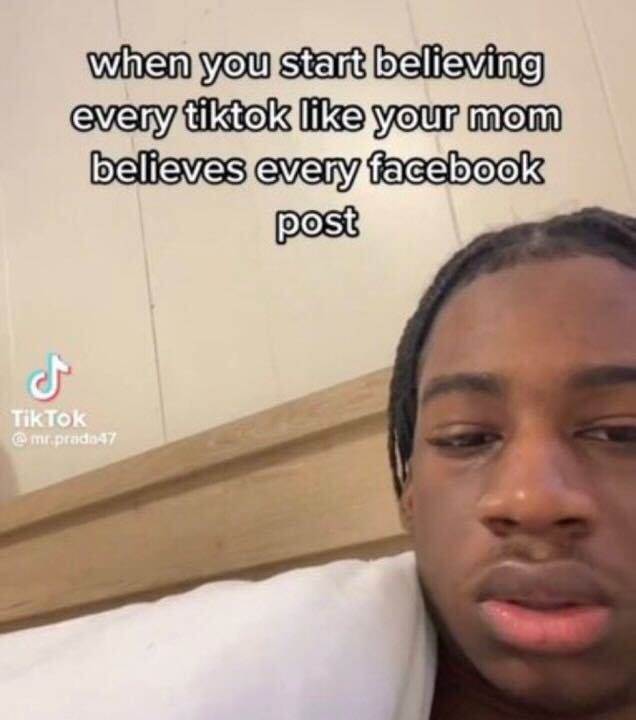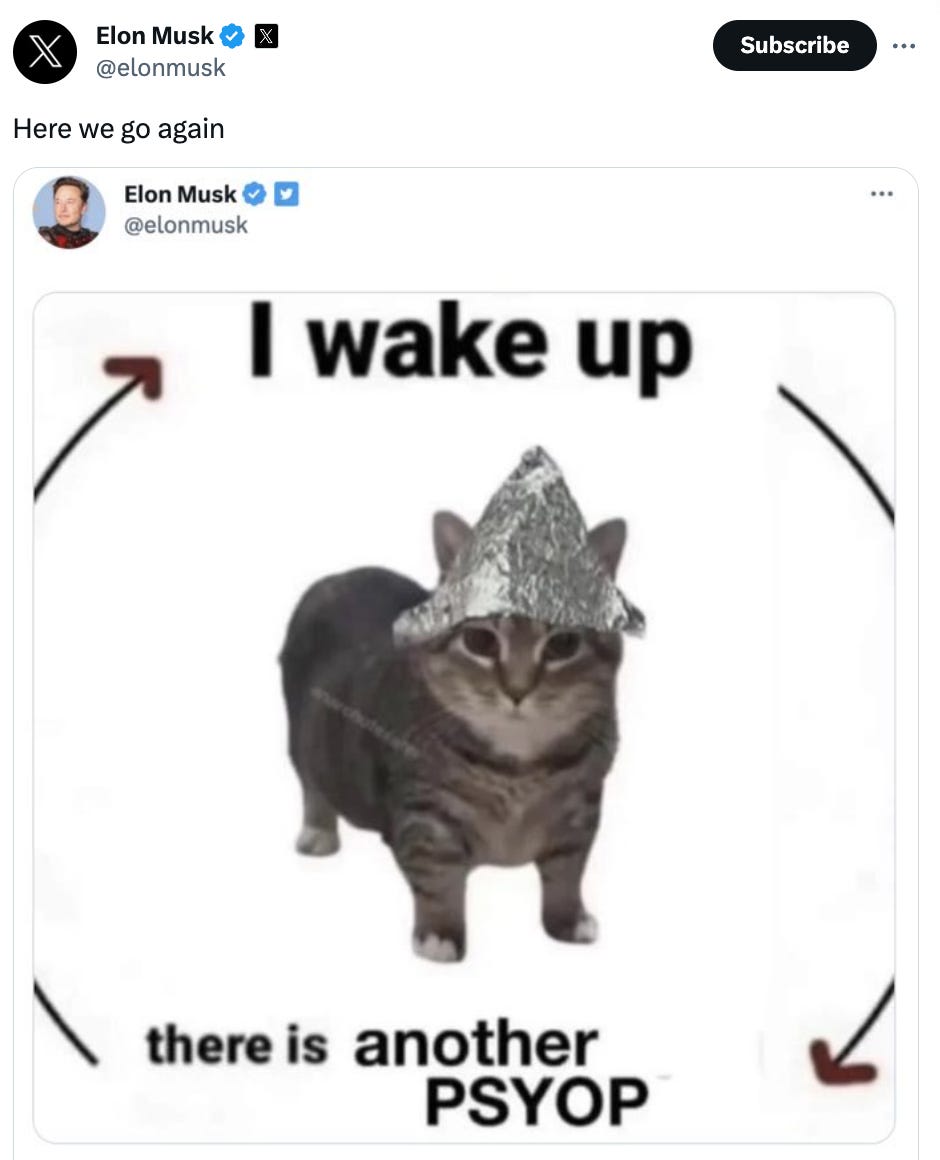MØRNING! Welcome back to QUICK FIRE, our fortnightly dispatch of insight and opinion, straight from the MØRNING studio.
This week, like everyone, we have misinformation on the brain. The truth seems to be getting harder and harder to find: buried under fake news, clouded by our biases, or censored from our feeds altogether.
Finding the facts feels like an impossible task. But it doesn’t have to be. At MØRNING, we’re on a mini-mission to try and shed some light on the mess that is digital media, so that we can keep at least one eye on the truth. Today, after that viral story about Taylor Swift’s bodyguard, we’re going down the internet rabbit hole that is: psyops. Without further ado…
Firstly, what the hell is a psyop?
Like all good words, the meaning of psyop has shifted over time. So here’s a (very) brief history.
Pre media: Originally, psyop stands for Psychological Operations, aka government or military operations designed to manipulate public opinion and influence the outcome of events. (Think wartime propaganda designed to sway public support a certain way).
Mass-media: With the invention of mass media in the 20th century, those in power could create psyops more easily than ever, by controlling the narratives peddled by the press. HyperNormalisation by Adam Curtis is a must-see deep dive on this: using archive footage from the BBC vaults, Curtis unpicks how, since the 1970s, the truth (events in the physical world) started to become replaced with a false reality (the narratives that are told about it), manufactured by politicians and mass media. Today, the whole media circus is, kind of, a pysop.
Social media: Psyops have had another little mass-market makeover recently. With social media fracturing our truths even further, almost anyone can create a psyop, with increasingly sophisticated tools to do so. In a world rife with conspiracy, ‘psyop’ has come to represent any kind of propaganda.
Right… so what do psyops look like in 2023?
Type 1 - straight up fake news: In a piece Gunseli Yalcinkaya wrote for Dazed earlier this year, she describes how a potent mixture of social media addictions and inescapable state x big tech surveillance is making us “increasingly suspicious of the methods of control we’re subjected to on a daily basis.”
In short: psyop paranoia has hit. To many members of the public now, calling out pysops feels like a way to reclaim the truth, like an equivalent of the popular right-wing term ‘red pilled’ (aka the choice taken, à la The Matrix, to see the truth). Psyops has become synonymous with f̲a̲k̲e̲ ̲n̲e̲w̲s̲ ̲e̲n̲g̲i̲n̲e̲e̲r̲e̲d̲ ̲b̲y̲ ̲t̲h̲e̲ ̲p̲o̲w̲e̲r̲s̲ ̲t̲h̲a̲t̲ ̲b̲e̲.
The irony is that (for the reasons above) many conspiracists believe fake news, and doubt real news, meaning its never been easier to create a modern psyop. The recent UFO frenzy is a great example: lots of the UFO conspiracies we see today have been planted by those in power in US, with the manipulation of public opinion being a clear pipeline. Novara Media’s podcast ep “The Art of the Psyop” is a great listen on the topic.
Type 2 - biased narratives built from facts: Here’s the tricksy thing with psyops… they’re not actually always fake news.
The recent Taylor-Swift’s-bodyguard-leaves-to-fight-for-Israel story is a prime example. Many internet commentators called out the story for being a psyop intended to convert Taylor Swift fans to Israel supporters, despite no one knowing if the man actually worked for Taylor Swift, or just the stadium. On X, a fact check service disproved the story, becoming a kind of psyops in itself to out the original story as fake. In the end, it turns out that the bodyguard was a long-term employee, the fact-check service was (scarily) incorrect, and the story was real.
But that doesn’t mean it’s not a pysop: either way, the story was used to share pro-Israel statements in entertainment news spaces without any further political context, ultimately furthering that cause with otherwise disengaged member of public.
The lesson learnt is nothing new, but all the more pressing today: The news isn’t always facts, but even facts can be used to create biased narratives.
Type 3 - memes: 2023 wouldn’t be 2023 without a bit of m̷̺̺̳͖̝͍̮͇̰̓è̴̡̨͉͙̯͖̣̜̻̺̽́̋̃̿͊̂t̷̯͗͠ą̶̧̖͈̖̖̝̒̋͑̒̇̒́́̚͠ now would it? Those that frequent internet deep space will know that nihilistic commentary on the fog of propaganda we find ourselves in is just one way people are trying to cope. Pysops, given their layers of meaning, are primed for memification. I’m gonna say it: pysops are kind of just the scheming older sibling of lore.
And this has become such a reality for the online generation that even pysops themselves are referencing their psyop status.
Take Tiktoker @lunchbaglujan. She works for the US Military as a Pyschological Operations (ring any bells?) Specialist, and her prime job appears to be creating army-adjacent content that glamourises life in the ranks for TikTok. But rather than try and hide her psyop status, she openly revels in it: her website is even called ‘SikeOp’. Lujan is proof that psyops, far from the covert operations they once were, can now be effective tools to prove internet relevancy.
 Tiktok failed to load.
Tiktok failed to load.Enable 3rd party cookies or use another browser
So, what do we do now?
It’s all a lot, isn’t it, when the truth is false and the false becomes facts. All we can do, really, is stay wise to these nü media tactics.
When it comes to media literacy, this means staying critical until proven otherwise:
Crosscheck references
Read news sources outside of your own political bubble
Keep up to date with credible fact checking resources, e.g.:
Independent think tanks like Forensic Architecture (with a reminder to always check up on where organisation’s funding comes from before trusting them as a resource!)
Media adjacent tools like BBC Verify, which, contrary to the bias of some BBC reporting, is doing a great job at investigating stories at the heart of information wars
Bias checkers like this (although, again, check up on who owns or funds them)
Right, that’s all for today. We hope you found this useful, but we’ve only just scratched the surface, so we’ll be back with more on how to navigate this digital media hellscape again soon.
For now, let us know what you think in the comments, over on Instagram, or on Whatsapp, where you can chat all things psyops with our bot, Ø.
Til next time! 👹
Editor: Letty Cole









I feel so seen by that first meme
Informative, thanks for this. 🖤